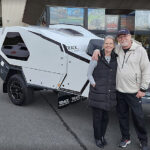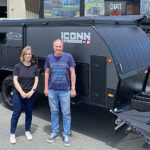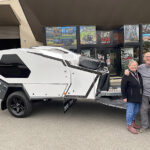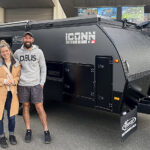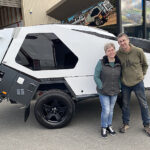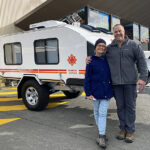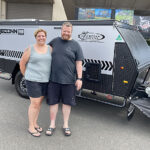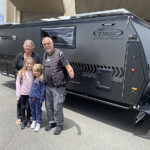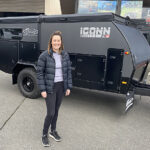Trip planning is as much about understanding your rig as much as anything else. Your choice of mobile lodgings, be it a hybrid, caravan or camper trailer needs to suit your intended purpose and for most people that will involve living off the grid for anything from a few days to a few weeks. After all, who can resist the temptation of free camping in scenic national parks, at least for a few days.

Your electrical system is paramount to your safety and enjoyment, providing power for lighting, appliances and entertainment. So it stands to reason that you should have a general understanding of its components and how it works. Time for an electrical audit!
Before you gasp in horror, an electrical audit is simply a functional review of what you can and can’t do without 240V power. If your travelling plans are limited to stays in caravan parks, then a basic electrical system will serve you well, but plans for free camping will require a full rethink.
A quick scan around the inside of your camper, should provide an insight about your off the grid capabilities. If all you see is 240V outlets and not any smaller cigarette or merit style 12V plugs, then your setup is geared towards caravan parks. But don’t despair, any good auto electrician can resolve this.
Auditing your Usage
With your 240V power lead disconnected and engine off, check all your electrical appliances in your camper. What works and what doesn’t – lights, stereo, cooker, TV, microwave, electric kettle and other 240V outlets.
The next step is to see how long your power supply will last in typical operating conditions.
A battery management system is a huge help in this respect. The better ones will help audit your devices by showing how much power they draw, simply by turning on each switch and appliance one by one and checking the readout. The good ones also have a fuel gauge style display showing how much is left in the tank and the expected range at the current usage rate.
Once you’ve established the draw of each light and appliance, do a field test. With your camper parked at a campsite or at least in your backyard, see how long you can last without generator or 240V power.
Make sure your fridges are full of cold food, both freezer and fridge compartments as this will draw less power. And try to camp at a location where you get good morning sun and afternoon shade. Generally speaking, the morning sun is cooler and derives better solar input. You should be able to top up to full charge in this period.
When it comes to solar, more is better than less, as it can compensate for overcast days when the suns rays are limited. We generally make do with 300W of solar but we have 408W available if required, with 288W of that as portable panels.
We use both roof mounted and portable panels to get the best solar performance. The portable panels allow us to camp in areas of afternoon shade and extend our portable panels out to a patch of sunshine.
Inverters
Without a direct 240V source such as a power pole at a caravan park or input from a generator, most 240V plugs won’t work without an appropriately sized inverter; a device that converts 12V power to 240V power. If you are using an inverter to run things like a laptop, the inverter will use a small amount of power in the conversion, so make sure you turn it off, when it is not in use. An inverter remote installed where you’re most likely to use off grid 240V power adds convenience, as opposed to switching the power off on the inverter itself, as its normally tucked away behind seating or panels. In our travels, we found our laptops were quite power hungry, particularly as we had one each!
Power storage
Most campers will have a battery box where the electrical hardware is stored. Generally speaking, anything less than two 120Ah deep cycle batteries isn’t going to be particularly useful for free camping, depending on the duration, appliances used, ambient temperature and use of power replenishing tools. Forget electrical appliances such as the microwave, electric kettle and air conditioning for free camping. These items are incredibly power hungry and simply won’t run without a monster inverter and a huge battery storage.
Some campers will use gas powered fridges for camping which is a good thing, as upright fridges can be quite power hungry when running on battery power alone. However, a good compressor fridge is generally regarded as the premium solution.
Power Replenishment
For touring holidays where you are travelling off the grid, a DC DC charger is an excellent way to get the best utilisation from your battery resources. DC DC chargers can bump your battery reserves are to a full 100% charge via multi-stage charging. With AGM batteries, the last 20-30% of charge is completed at a much slower rate, something you can’t do with standard Anderson plug charging. And with a fuller battery, you score better utilisation of your available resources. Lithium batteries charge much more quickly which gives them strong appeal.
Solar power can be a little problematic. A fixed panel on a camper is only good if you park in the sun, which makes it a warm spot to be. Portable panels can only really be used when you are around camp, as they tent to grow legs and walk when you’re not. Make sure you have a good regulator such as a maximum power point tracking (MPPT) unit, as they derive the best solar input.
Historically the typical suitcase style portable panel kits were bulky and heavy, but these days there are lighter, foldable blanket style panels that are much easier to manage. And unlike a generator, beyond the initial purchase price, there are no ongoing operating costs.
Generators are one of the easiest sources of power. A quick pull of the starter cord and they can be generating power without the need for sun. Most generators run on unleaded fuel, so it means carrying around a supply. But like the old style solar panels, they are bulky and heavy. Add to that the noise and the petrol fumes and there are a few detractors to consider.
Wrapping Up
Getting your head around electrical systems and its components can be a bit of a head spin for the uninitiated, but it’s worth exploring, particularly if you travel alone. Author Collyn Rivers has written a number of excellent books on understanding camper electrics and using solar power, which is a huge help in the demystification process. These are available in-store.

